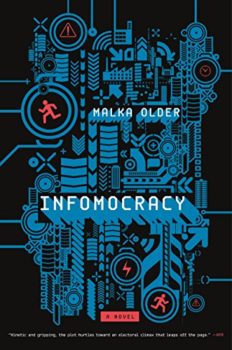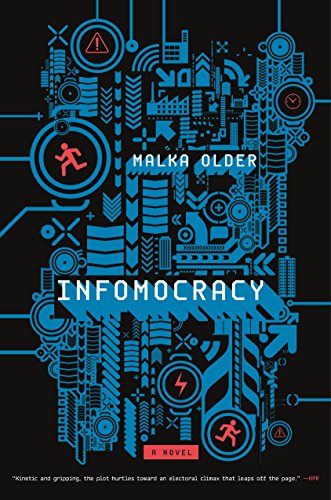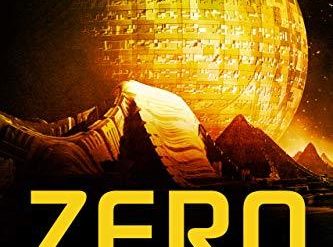
These days, most science fiction novels that portray future political systems are dystopian tales. The examples are legion, beginning with Brave New World, 1984, and The Handmaid’s Tale. There are hundreds more. So it’s a little unusual to come across a story that features a new wrinkle on democracy—one that somehow seems to be working reasonably well, in the author’s telling. That’s the basis of Infomocracy, the first volume in Malka Ann Older’s Centenal Cycle. The novel gives an intriguing new twist to the future of democracy.
Estimated reading time: 4 minutes
A hyper-local spin on the future of democracy
Older’s society of the 2060s is grounded in the concept of the centenal. Almost always, a centenal is a geographical area of 100,000 people that elects its own government. (In a few cases, isolated areas such as island nations have a lower population.) Most of the world’s territory is organized into centenals. But large swaths of the United States and some other countries remain under their old governments.
Infomocracy (Centenal Cycle #1) by Malka Older (2016) 382 pages ★★★★☆
Worldwide, 33 of the 2,207 competing government systems dominate most of the centenals. The overwhelming majority of governmental systems (much like brands) are strictly local and govern at most a few centenals. Fewer than ten of the 33 credibly compete for the Supermajority, which is the equivalent of a world government in a highly federalized system. One government, Heritage, has held the Supermajority for all twenty years since the centenal system went into effect. A half-dozen others vie to replace Heritage in the election that is the subject of Infomocracy.
In the bitter battle for the Supermajority, “[e]very centenal, every collection of one hundred thousand neighbors, matters, whether it is spread over hundreds of miles in the tundra or crammed into a couple of overdeveloped blocks in Dhaka.”
Micro-democracy in action in all its diversity
The systems imposed by the many competing governments are strikingly different. For example, Heritage is conservative, as the name implies, and allows little to change. Liberty is what we today would call a right-wing libertarian system in which anything goes. Policy1st is all about government that serves the people’s demonstrated needs. SecureNation is dominated by armed forces. This is micro-democracy in action in all its diversity.
The centenal system is effectively administered by Intelligence. This is a massive global bureaucracy that tends to all the world’s communication and information needs—a Google, of sorts, on steroids.
There is no explanation for how the centenal system came into being. But it clearly has its roots in a fundamental belief that “democracy is of limited usefulness when there are no good choices, or when the good choices become bad as soon as you’ve chosen them, or when all the Information access in the world can’t make people use it.” Perhaps there’s no more insightful comment that can be made about the state of American democracy today. And perhaps that statement applies t0 much of Europe these days as well.
However, if the centenal system described in Infomocracy is intended as a remedy to today’s political ills, it’s a non-starter. Just imagine requiring every jurisdiction of 100,000 people in a world of seven billion to administer (or subcontract) its own defense, foreign, and trade policies!
A small cast of principal characters
The action in Infomocracy revolves around a small cast of principal characters:
- Ken is an “undercover political operative” for Policy1st who travels around the world boosting his government’s prospects for seizing the Supermajority by taking advantage of opportunities as they arise.
- The spokesperson for Policy1st and Ken’s boss’s boss is Suzuki. It is he who carries the Policy1st banner in the free-for-all debates held before each election.
- At Information, Mishima holds a senior but unspecified position. She appears to be a troubleshooter. Like Ken, she travels the world as a problem-solver.
- Shamus is a second-generation Irishman of African descent works as an “advid designer” and public relations specialist for hire by governments that seek to move up in the rankings.
- The centenal system has its unbelievers, and Domaine is a prime example. He’s not a terrorist working to disrupt the system, but he disdains the conviction that democracy truly reflects people’s wishes and meets their needs. He is instead an activist who travels to sow doubts about the system wherever he can.
About the author
Author Malka Ann Older has worked around the world in humanitarian relief programs. She is the Senior Fellow for Technology and Risk at the Carnegie Council for Ethics in International Affairs and is a PhD candidate in the sociology of organizations in France. Infomocracy was her first novel. Two further books in the Centenal Cycle have been published to date.
For related reading
For more good reading, check out:
- These novels won both Hugo and Nebula Awards
- The ultimate guide to the all-time best science fiction novels
- 10 top science fiction novels
- The top 10 dystopian novels
- Ten new science fiction authors worth reading now
You might also check out Top 10 great popular novels.
And you can always find my most popular reviews, and the most recent ones, on the Home Page.



























